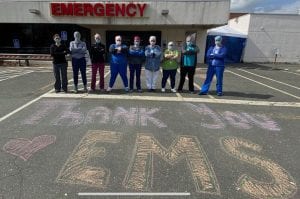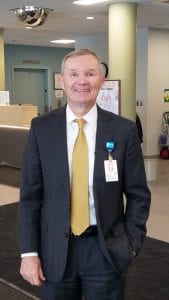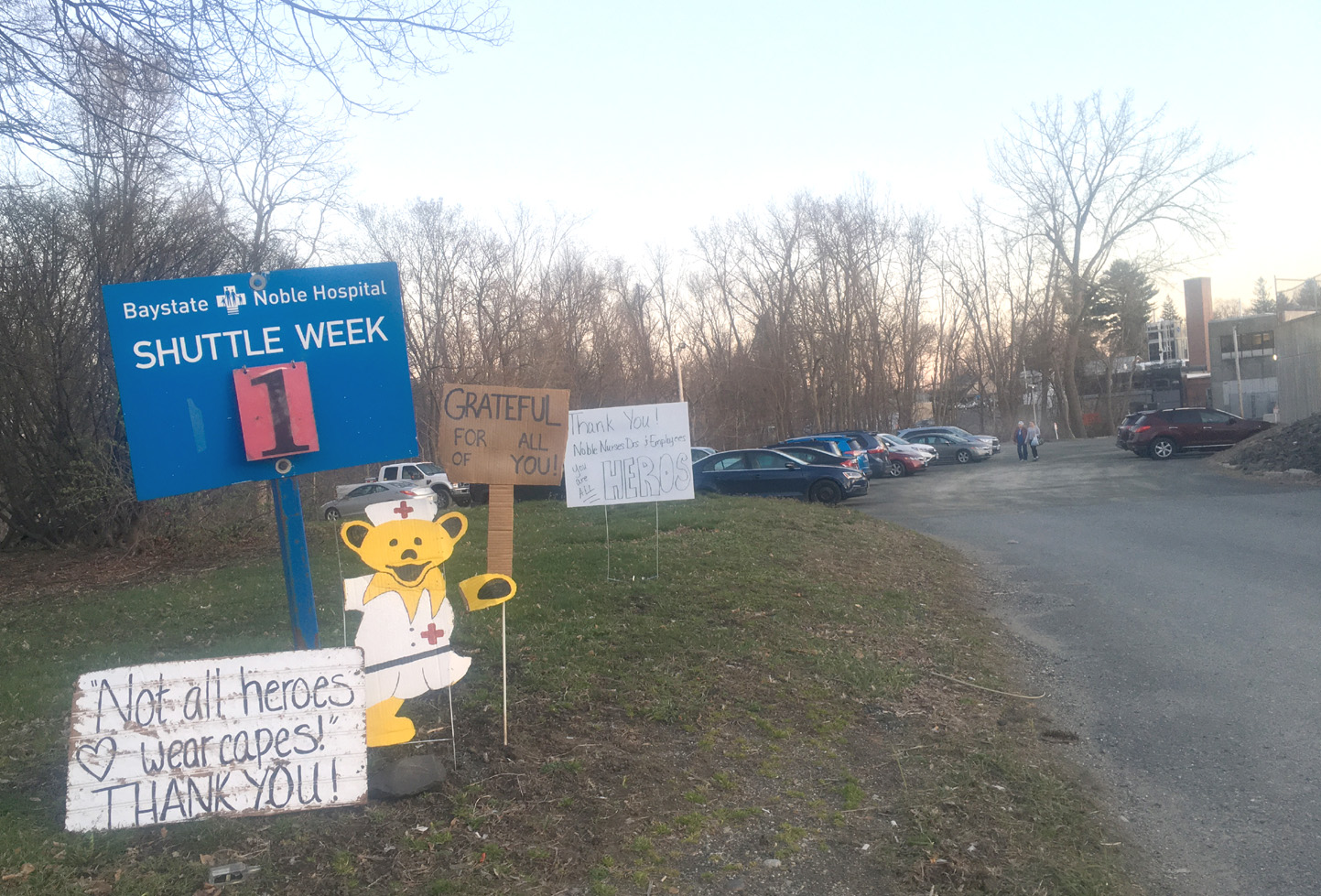
Staff at Baystate Noble Hospital share a message to their EMS colleagues. (BAYSTATE NOBLE PHOTO)
WESTFIELD-For 127 years, area residents have depended on the healing presence provided by the physicians, nurses and therapists of Baystate Noble Hospital.
While the hospital’s health care programs and services, along with technology, have evolved over the years, one constant remains – ensuring that the needs of the Greater Westfield area are met.
That challenge was met head-on this spring when the coronavirus pandemic took hold in the city, and employees in all areas of the hospital were prepared for battle.
During the height of the pandemic, Ronald Bryant, president of Baystate Noble Hospital and Baystate Franklin Medical Center, said he was splitting his time eventually between the two facilities to ensure that if there were specific needs being encountered, he could address them immediately.

Ron Bryant, CEO of Baystate Noble Hospital in Westfield.
Baystate Health purchased Noble Hospital in 2015 and it was renamed Baystate Noble Hospital. The 91-bed acute care hospital employs just under 500 employees, according to Bryant.
“Health care workers are always ready to face any type of community disaster, from hurricanes to ice storms,” said Bryant. “I am proud of how Baystate Noble Hospital’s workers met all of the challenges at the height of the pandemic and continue to take care of our patients exceptionally well on a daily basis.”
Bryant noted once the pandemic was at its height, early elective surgeries, outpatient visits and procedures had to be canceled.
“Like any other business or organization, when you lose your business, you don’t go unscathed,” he said, noting the hardest hit timeframe came from the end of March through May.
As an example, Bryant said the Emergency Department lost 50% of its walk-in business during that time.
“We typically see 2,400 visits per month in the Emergency Department,” said Bryant, adding, “We saw on average half of that, and of the half we did see, we were also taking care of COVID patients and those suspected of having COVID.”
While patient volumes started to return in June with more services able to be provided, it wasn’t until July that the hospital started to regain its pre-pandemic volumes.
“Our Emergency Department is almost back to pre-COVID levels as well as our Radiology Department,” said Bryant.
While many businesses across the spectrum have been impacted by the pandemic, Bryant said Baystate Noble Hospital will weather the storm and come out even stronger.
“We are continually changing and transforming ourselves as a health care provider,” said Bryant. “We are here to facilitate and provide an innovative health care environment for the Greater Westfield area.”
While many in the community have used a plethora of hospital services over the years, depending on one’s needs, Bryant said the list of services offered through Baystate Noble Hospital are extensive.
Services include specialists in the fields of cardiovascular and pulmonary rehabilitation, emergency medicine, gastroenterology, laboratory services, mammography, neurology, obstetrics and gynecology, urogynecology, and urology. Additionally, services focus on breast care, heart and vascular issues, and kidney health.
Rehabilitation services are also varied and include physical medicine (Physiatry), physical therapy, speech, language, and swallowing therapy, audiology and hearing services, and occupational therapy.
“We’re here to facilitate and provide a continuum of health care for those in the community,” said Bryant. “A large portion of our business is outpatient and that is where health care is going. We need to be in that realm to ensure that the services needed in the community will be provided.”
As the acceleration of Telehealth was used by specialists this spring because of the pandemic, Bryant expects to see more advances in technology like Telehealth become more prominent in the years to come.
“The pandemic really accelerated what we do with Telehealth,” he said, adding, “This wasn’t something that was prominent three years ago. The use of Telehealth this spring also accelerated how the government and insurance companies think about the service and how to pay for it. When processes like Telehealth all fit together then I think you will see change.”
Bryant noted that during the past five years, gradual improvements have been made to services and to the delivery of care, as well as upgrades to the infrastructure, including the heating and ventilation system, a new front lobby, and an outpatient Baystate Reference Labs.
“We also have electronic medical records which has really enhanced the patient experience and the safety and quality of care provided at Baystate Noble Hospital,” said Bryant.
Bryant said he co-chairs a Community Benefits Advisory Council (CBAC) with Eliza Lake, chief executive officer, Hilltown Community Health Center, as a way to exchange ideas about health care needs in the region, as well as making investments that provide treatment or promote health and healing as a response to identified community needs.
The CBAC at each of Baystate Health’s four hospitals, including Baystate Medical Center in Springfield, Baystate Franklin Medical Center in Greenfield, Baystate Wing Hospital in Palmer, and Baystate Noble Hospital, includes key organizational stakeholders and community representatives.
“We select members of the council from across the spectrum, ensuring that everyone is represented, and then we look at what types of needs there are and how we can help,” said Bryant.
In recent years, grants have been distributed to the Boys and Girls Club of Greater Westfield for afternoon programs, and the Westfield Council on Aging has received funding for programs and services offered at the Westfield Senior Center.
Bryant said he encourages local organizations to submit RFP’s to the CBAC for community projects.
Bryant also thanked the Greater Westfield community for its generous donations made this spring to hospital employees during the height of the pandemic.
“A day didn’t go by that an organization was sending food, supplies, or doing drive-bys to say thank you to our employees,” said Bryant. “I saw firsthand how good that made our employees feel and how much appreciation they felt toward the community.”
Bryant said his greatest takeaway from the early months of 2020 was how each employee took their individual role to a new level.
“I don’t think you can say enough about the work ethic and the dedication that our employees display every day in their respective roles,” said Bryant, adding, “We also appreciate the way the community rallied around us as we have to band together to combat this pandemic.”
As Bryant and his leadership team continue to seek ways to care for the community’s needs, he is bullish on the future.
“Health care is moving the four walls of the hospital and we have to be contemporary in our thinking of how we deliver that care in an ever-changing health care environment,” said Bryant. “We will continue to look and evaluate the core services that the community needs on an every day basis and adjust the way we deliver that care through a variety of ways including integrating health networks, upgrading chronic disease management programs, and offering wellness programs, clinics and screenings.”


